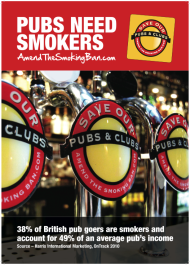An interesting debate is brewing about the future of snus. Snus is a form of smokeless tobacco that has been popular in Sweden for, oh, yonks. When the country became the 15th member of the EU in 1995 it managed to negotiate an exemption from a law banning the sale of snus within the EU, and that remains the situation today.
What has changed is that some members of the anti-smoking industry have started to champion snus as part of a harm reduction initiative. A recent issue of the British Medical Journal (February 16) featured a "head-to-head" debate between John Britton, professor of epidemiology at City Hospital, Nottingham, and Alexander (Sandy) Macara, president of the National Heart Forum and a former chairman of the British Medical Association.
Britton is a familiar figure in the smoking debate. If pushed, I would describe him as a hardliner. (It was he, for example, who famously declared there is "no debate" about the threat of passive smoking.) Nevertheless, it is Prof Britton who wants the ban on snus to be lifted. You can read the full article HERE.
Another advocate of smokeless tobacco is Clive Bates, the former director of ASH. Writing on his blog, Bacon Butty, in September 2007, Bates didn't mince his words when he declared that:
If you want to say something absolutely jaw-dropping in its idiocy, then you need to cloak it in lots of fake sophistication. And this is what ASH Scotland has done with its new position paper on smokeless tobacco. No less than 266 references are used to support the truly stupid idea that smokeless tobacco, which can substitute for cigarettes and is far less hazardous, should be banned.
He went on to add:
The thing I find most troubling about this sort of posturing is what it means at an individual level. In effect, these remote health planners are saying to a person who smokes cigarettes that they should not have access to a much less risky alternative. Where did the acquire the authority and the bare-faced arrogance to do that? How did they become so sure of themselves that they feel qualified to restrict the harm reduction options available to someone struggling with addiction? So on those estates in Glasgow, where smoking prevalence can be as high as 70%, ASH Scotland says 'no' to lower risk alternatives. You must quit. And if you don't quit - well, you might as well die.
Strong stuff, well worth reading. See HERE.
And for a brief history of snus, read THIS.
 Wednesday, December 2, 2009
Wednesday, December 2, 2009 









